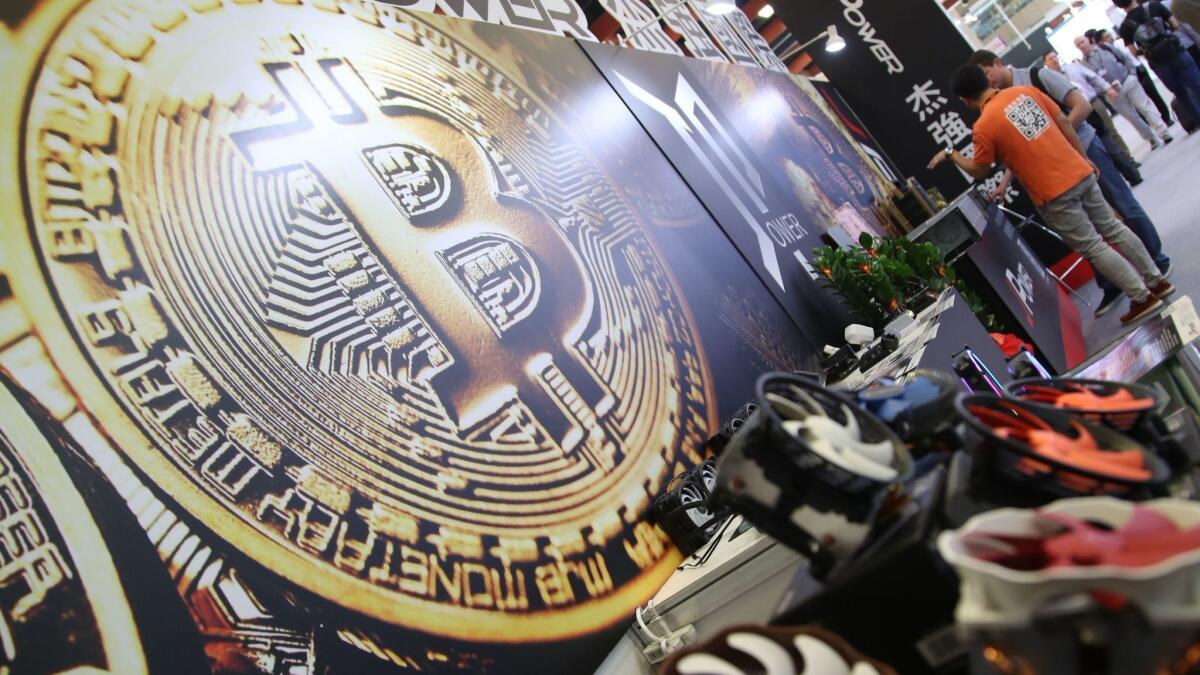Is this scathing report the death knell for bitcoin?

- Share via
As if bitcoin fans didn’t have enough to worry about these days, a widely respected international bank has just published a scathing analysis of the cryptocurrency questioning whether it ever will be more than a fad — and a costly fad for its adherents.
The report by the Swiss-based Bank for International Settlements doesn’t present any particularly novel questions about bitcoin and related virtual currencies. But it brings together all the existing questions and validates them, with facts and figures.
The BIS says its goal was to look “beyond the hype” of bitcoin. What it found was a currency-like system that can’t handle a scaling up of transactions, can’t provide the trustworthiness required for a functioning currency, and requires so much computing power to keep track of exchanges that it already has become “an environmental disaster.”
The quest for decentralized trust has quickly become an environmental disaster.
— Bank for International Settlements
That’s just for starters. The BIS report, which is a chapter in the institution’s annual report, comes against a backdrop that includes a six-month price collapse, government enforcement actions against alleged cryptocurrency frauds and reports of hackings costing bitcoin owners the equivalent of tens of millions of dollars in the blink of an eye.
You can expect the bitcoin faithful to dismiss the BIS report as the incumbent central banking establishment trying to bring down a challenge to its primacy. It’s true that the bank is part of that establishment. Often described as the central bank for central banks, the BIS acts as a counterparty and agent for central banks in their transactions. But its duties also include policy analysis and research of interest to those member banks; producing an inaccurate or unfair analysis of a rival marketplace wouldn’t be much of a service for those members.
The BIS report includes a precis on the definition and role of money — worth a read by bitcoin fans and skeptics alike. As it observes, a functioning monetary system must comprise three features — a “unit of account” that allows price comparisons for goods and services, a medium of exchange accepted as payment by buyers and sellers alike, and a store of value that remains stable over time — the money in your bank account, wallet or mattress shouldn’t fluctuate widely.
No such systems are perfect, the BIS acknowledges. Indeed, the British Museum devotes a whole room to the stones, shells, coins, paper and other objects that once served all those three roles and fell out of favor. Nor is government-issued currency immune from abuse, as is plain from the experiences of the Weimar-era German mark and today’s debasement of the currency of Venezuela. But the central bank systems that sprung up in the late 19th and early 20th centuries and were refined in the aftermath of the Great Depression were responses to such crises.
Bitcoin and other such instruments aspire to the three roles of money, but can’t deliver, BIS says. Although the systems ostensibly incorporate safeguards against counterfeiting, no central authority stands behind them as a trusted counterparty. Bitcoins’ value “derives only from the expectation that they will continue to be accepted by others,” BIS says. In this they resemble “commodity money” such as salt or rice--except that unlike those commodities, bitcoin has no intrinsic value.
Among the more damning findings of the BIS paper is the cost of injecting trust into the bitcoin system by vesting control of the bitcoin supply in the hands of “miners.” These are people or groups that use computers to verify and validate transactions via algorithms that, once solved, produce additional bitcoin supply for the miners (up to a hard limit of 21 million bitcoins).
That system is unsustainable, the BIS says. The electrical use devoted to mining bitcoin alone already equals that of Switzerland: “The quest for decentralized trust has quickly become an environmental disaster.”
There are other grounds to doubt whether bitcoin can grow large enough to serve financial transactions on anything like a global scale. For bitcoin to verify transactions on the scale of Visa or Mastercard systems today would require supercomputers and “communication volumes [that] could bring the internet to a halt.”
Then there’s the vulnerability of cryptocurrencies to manipulation by miners, software errors or hackers.
BIS acknowledges that some technologists believe that the technology underlying bitcoin, known as blockchain technology, could have more value for central banks or international financial systems than bitcoin itself. It’s skeptical. Tests by some central banks have experimented with such systems, successfully. “However,” it finds, “the results have not been clearly superior to existing infrastructures.”
The BIS report in itself may not shake the faith of the bitcoin faithful, whose commitment to the currency often rests in an anti-government ideology. Bitcoin remains hugely volatile — its price in dollars gained 4% Monday, according to the Coindesk service, though at about $6,700 it has lost about two-thirds of its peak of nearly $20,000 in mid-December.
BIS has done a service for finance professionals in providing a baseline judgment of whether bitcoin is worth serious consideration as an asset class at a time when investment banks such as Goldman Sachs are offering clients access to the market. The banks appear to be responding to their clients’ wishes. But whether they’re actually providing those clients with a worthwhile service is a different question, and BIS suggests the answer may be no.
Keep up to date with Michael Hiltzik. Follow @hiltzikm on Twitter, see his Facebook page, or email michael.hiltzik@latimes.com.
Return to Michael Hiltzik’s blog.
UPDATES:
9:17 p.m., June 19: This post has been updated to clarify the nature of “commodity money.”
More to Read
Inside the business of entertainment
The Wide Shot brings you news, analysis and insights on everything from streaming wars to production — and what it all means for the future.
You may occasionally receive promotional content from the Los Angeles Times.











